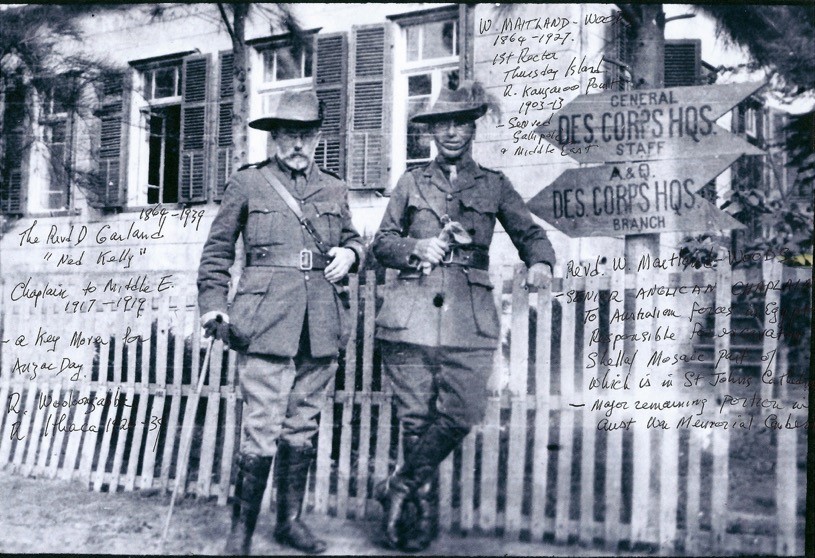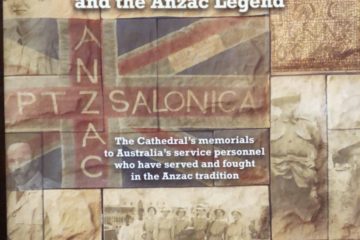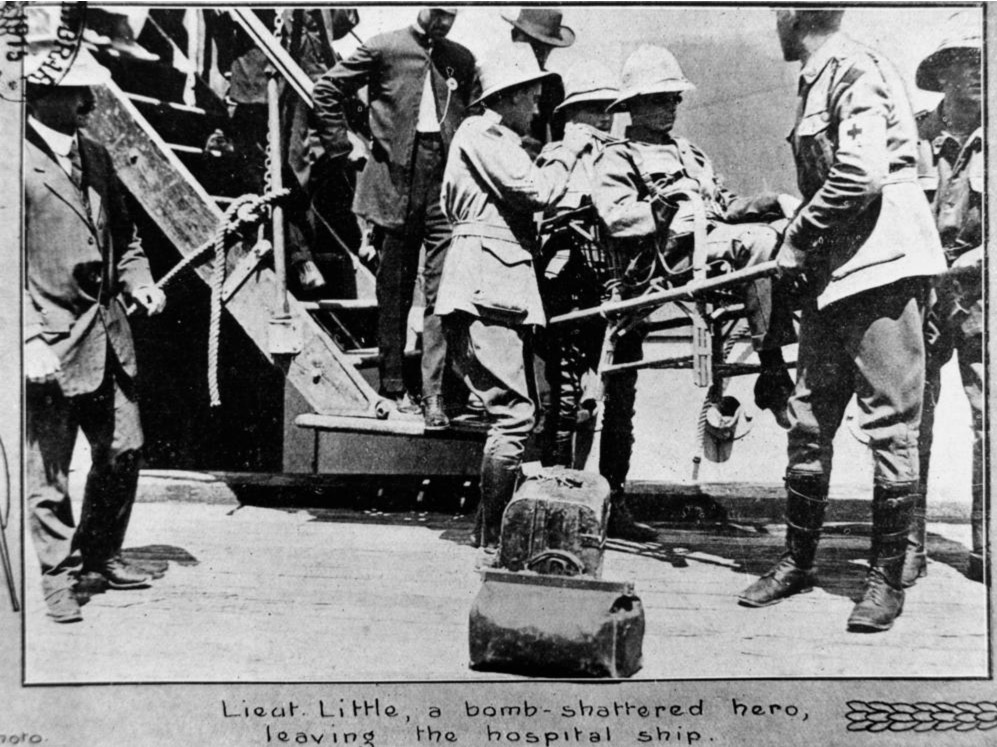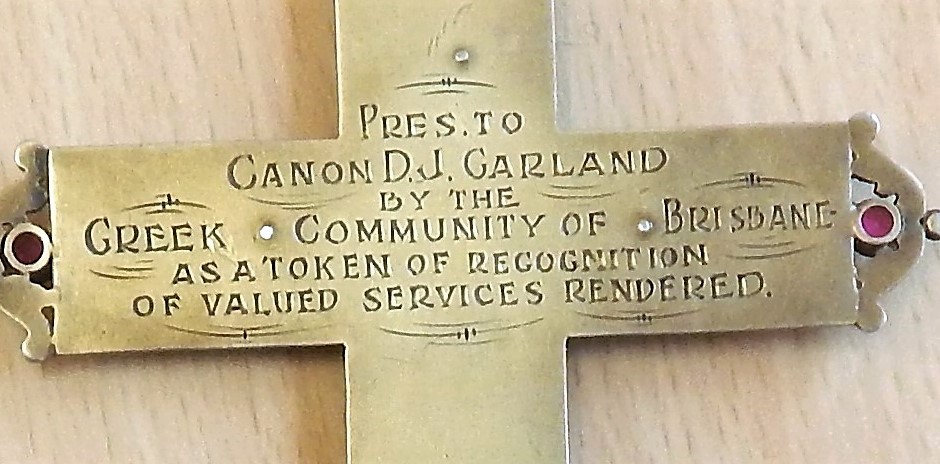Work of the chaplains

PICTURED ABOVE: Canon Garland (at left) in his Chaplaincy tunic and Lieutenant-Colonel’s insignia with fellow chaplain, LTCOL the Reverend William Maitland Woods, outside the 1 ANZAC Corps headquarters, Cairo, late 1917. From 31 July 1916 Reverend Woods was Church of England Senior Chaplain on the staff of Major-General (Sir) Harry Chauvel’s ANZAC Mounted Division, based at Cairo, Egypt. The rector of St Mary’s Anglican Church, Kangaroo Point, between 1903 and 1913, a bell, belfry and inscribed tablet to Reverend Wood’s memory were unveiled at St Mary’s in 1928. The Maitland Woods Papers are held in the Heritage Collections of the State Library of Queensland and include wartime correspondence with Canon Garland.
WORK OF THE CHAPLAINS.
On the Palestine Front.
THE following letter from the Rev. Maitland Woods (well known in Brisbane) [ William Maitland Woods ] recently appeared in the Sydney “Church Standard”:–
“I wonder if the church people of Australia know what Chaplain Canon Garland [ David John Garland ] is doing for our Australian lads on this Front?
“He arrived from Australia a few days before the fall of Jerusalem – we had been fighting and marching from 31st October to 10th December.
“Many chaplains had, alas!, fallen by the way utterly exhausted; one had been killed, another seriously wounded, several were only fit for hospital, but bravely battled on.
All were anxious to see the Holy City – Jerusalem! – that wonderful symbol of religious hope which has shone through all the ages and still holds aloft the promise of a ‘parliament of nations, the federation of the world’.
“But we were deadly tired, and the rate at which evacuations were taking place, seemed to promise a very serious shortage of padres at the very time when their men would most look to them to explain the wonderful history of the hill country of Judaea, which we were then entering.
“Now the chaplain’s department in Egypt differs from the French Front in this way: There are not sufficient of us Australian padres to reach all the men, much less to have one who shall superintend the administration and reside at H.Q., Cairo.
“So you see we all have our job to do, which means that each one of us has hundreds of men to attend to in various ways.
“And they do look to the padre, that is, of course, if they know that he is out to do his work and be a father to all the boys.
“So all we could do in the way of cohesion was to write to one another sometimes, and wave a joyful salutation if one Brigade passed the other, which was not often.
“I remember at Ramleh, near Jaffa, seeing a slightly bearded face light up with a smile and a grimy hand waving to me, I made feeble signs of recognition, wondering all the time who it was.
“It was the padre of the Nth Brigade L.H. [ sic, Nth Brigade Light Horse ], his hair was through his hat, his riding breeches were torn all up the side.
“I can’t describe the state he was in. I also noticed that his hair had gone almost white. But he was smiling – he had a nosebag full of cigarettes and some matches for his boys; they hadn’t had a smoke for a week, and there wasn’t a match in the whole regiment.
“When I looked at him closely I noticed that the skin of his face was drawn so tight and (to quote Shakespeare) ‘his nose was sharp as any pen’.
“Starvation marks everywhere, but he was sticking to his job because he knew that should he leave there was no padre to take his place.
“We were ‘all out’ and there was a lot more fighting to be done in the hills towards Jerusalem.
“At this period septic sores were very prevalent; the least abrasion of the skin and the edges began to eat away like leprosy, spreading at a most alarming rate.
“A septic sore on the face, and shaving was an impossibility.
“Was it surprising that we sometimes did not recognise one another?
“Often men and officers had to lie down and sleep in the mud and carry on for another day’s push without the least chance of a wash and brush up – we were a sorry-looking lot.
“Many padres had lost all their kit and just had what they stood up in.
“One (good faithful soul) was almost in tears; he had lost his communion vessels. I could not help him. I only had the set I carried jingling in my haversack.
“He had ridden back, food-less, searching for them. But with the arrival of Canon Garland, a new power seemed to arise.
“He was here, there, and everywhere at the same time, and he had your Church of England Australian Fund at his back: the men received all sorts of comforts. There was business direction behind the effort from Australia.
“I visited the Nth Brigade [ sic ], to see how things were. They remarked: ‘We are all right; we had a visit from Canon Garland, and he has fixed us up splendidly’.
“How he got almost a ton of fruit to our parched troops on the Jericho Plains I do not know, but he did it.
“A new communion set was forwarded to the disconsolate padre; for another a surplice and cassock were forthcoming; for another a sum of money.
“Funds were also forthcoming so that cables could be sent to a lad’s mother in Australia when he was lying wounded: ‘Doing well, love, Jack.’
“I wondered if our Australian mothers would know who it was who had thoughtfully made so many of these cheery cables possible. And all this by a Cathedral dignitary.
“In all my three years at the Front I must say I never felt so cheered.
“At last the great gulf fixed between the authors of scholarly pronouncements in regard to this ‘World Cataclysm’ was being bridged.
“Someone from a cathedral was doing the job, which it seems had only been thought worthy of a common parish priest, who after all, didn’t count so much and could be easily spared as a short end.
“Now we thought at last our existence was remembered, and that Canon Garland was sent out to show the church cared for us.
“Could it be that, at last, the bishops in Australia were waking up to the tremendous importance of sending a fresh supply of the very best priests to do the very best and most important work our church ever undertook.
“Had they at last realised the tremendous opportunity the church had of showing she understood?
“If Australia had sent her best sons to The Front, then surely the church should send her very best priests.
“We had heard so often that they were willing to come – then why were we so short of chaplains? Always under our strength.
“Now, however, a new hope has arisen, and we seem to be able to face the next few years of war with a confidence that better counsels are obtaining in Australia.
“Some of us perhaps will he able to get a real holiday, knowing that our work will go on as before.
“When General Allenby [ Edmund Henry Hynman Allenby ] took over the command in Egypt a wonderful thrill went through all ranks; it spelt victory we knew, but we could not explain.
“Now we want the same in our church. You in Australia can see to this.”
– from page 16 of “The Telegraph” of 7 September 1918.


